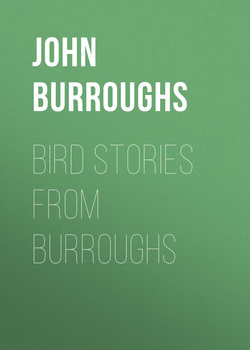Читать книгу Bird Stories from Burroughs - John Burroughs - Страница 6
THE COWBIRD
ОглавлениеThe cow blackbird is a noticeable songster in April, though it takes a back seat a little later. It utters a peculiarly liquid April sound. Indeed, one would think its crop was full of water, its notes so bubble up and regurgitate, and are delivered with such an apparent stomachic contraction. This bird is the only feathered polygamist we have. The females are greatly in excess of the males, and the latter are usually attended by three or four of the former. As soon as the other birds begin to build, they are on the qui vive, prowling about like gypsies, not to steal the young of others, but to steal their eggs into other birds' nests, and so shirk the labor and responsibility of hatching and rearing their own young.
The cowbird's tactics are probably to watch the movements of the parent bird. She may often be seen searching anxiously through the trees or bushes for a suitable nest, yet she may still oftener be seen perched upon some good point of observation watching the birds as they come and go about her. There is no doubt that, in many cases, the cowbird makes room for her own illegitimate egg in the nest by removing one of the bird's own. I found a sparrow's nest with two sparrow's eggs and one cowbird's egg, and another egg lying a foot or so below it on the ground. I replaced the ejected egg, and the next day found it again removed, and another cowbird's egg in its place. I put it back the second time, when it was again ejected, or destroyed, for I failed to find it anywhere. Very alert and sensitive birds, like the warblers, often bury the strange egg beneath a second nest built on top of the old. A lady living in the suburbs of an Eastern city heard cries of distress one morning from a pair of house wrens that had a nest in a honeysuckle on her front porch. On looking out of the window, she beheld this little comedy, – comedy from her point of view, but no doubt grim tragedy from the point of view of the wrens: a cowbird with a wren's egg in its beak running rapidly along the walk, with the outraged wrens forming a procession behind it, screaming, scolding, and gesticulating as only these voluble little birds can. The cowbird had probably been surprised in the act of violating the nest, and the wrens were giving her a piece of their minds.
Every cowbird is reared at the expense of two or more song-birds. For every one of these dusky little pedestrians there amid the grazing cattle there are two or more sparrows, or vireos, or warblers, the less. It is a big price to pay, – two larks for a bunting, – two sovereigns for a shilling; but Nature does not hesitate occasionally to contradict herself in just this way. The young of the cowbird is disproportionately large and aggressive, one might say hoggish. When disturbed, it will clasp the nest and scream and snap its beak threateningly. One was hatched out in a song sparrow's nest which was under my observation, and would soon have overridden and overborne the young sparrow which came out of the shell a few hours later, had I not interfered from time to time and lent the young sparrow a helping hand. Every day I would visit the nest and take the sparrow out from under the potbellied interloper, and place it on top, so that presently it was able to hold its own against its enemy. Both birds became fledged and left the nest about the same time. Whether the race was an even one after that, I know not.
